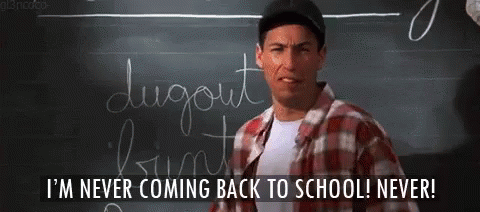A few weeks ago, I was having a talk with my uncle about the real importance of getting into a good college while making sure that you get the most out of your college experience, both socially and professionally. We were specifically talking about my cousin who is entering her last year of high school, but the conversation started to swerve in a few different directions.
We all have been conditioned to believe from an extremely early age that obtaining a college degree of any sort is the "be all and end all" of placing you on the right path to success, or at least the kind of success that we are accustomed to believing is the most important. If you want to live the kind of life glorified in this idealistic "American Dream" and focused on in 95% of the sitcoms on television, it is a necessity to get a college education, followed up with a "career job."
But as I was saying, if you want to live the life that our society and culture has come to value, it is important to get a college education and to truly make the most out of your experience. How many of you have sat in a high school classroom and said to yourself, "Oh, it's cool. This is senior year. All I need is one more English credit, and then I can schedule three study hall periods." I had that conversation with myself numerous times throughout 2006-07 while sitting in one of those creaky wooden desks. It's been a while since I've been in a high school classroom, but the morale of most high school seniors hasn't changed all that much.
The sad part about all of this is that unlike high school, once you enter into college, you can't do that. It's not about taking the "easy classes" just to fill up credits. Understandably, most students are required to get somewhere around 128 semester credit hours to attain a bachelor's degree depending on the major. For the most part, as long as the student fulfills the base core requirements and has a certain amount of credit hours in the major that they choose, they can graduate with a bachelor's degree in their specific major.
But what is that really saying? Is that saying that you are automatically going to have several opportunities at a six-figure salary right after you graduate in May? Does that mean you're going to have the opportunity to leave college and just have a great job in your field open up like a can of tomatoes within two months? No, probably not.
The one complaint that is echoed throughout most of the business world is that many students are generally not prepared for the actual job, even with a degree in the field. Employers are not only looking for you to have a degree — although that's still a requirement — they are also looking for their applicants to have done something more than just their degree to prepare them for the job itself. Whether it’s use some of your electives to take a real estate class or an internship, all of it can pertain to your major and field while more importantly pertaining to what the actual employer wants.
Honestly, I would love to learn how to do ceramics and make an EPIC flower pot. But would learning ceramics help anything in my accounting field? Maybe, if I was wanting to start up a ceramics business or store, but in general with an accounting degree, it probably wouldn't help me all that much. Point being, why would someone take it? Now granted, maybe in high school it could have gone through because really, isn’t the entire point of high school just to get into a good college? In an environment like that, you probably can just worry about getting the credits any way you can. But in college? Not at all. I mean, I would love to learn how to do ceramics or bowl…but do I really wanna spend $15,000 dollars a year to do it? Probably not.
I’m not trying to insult anyone that loves ceramics and would love to take classes like that in college. I am just wanting to get across that in the job market, the entire point is to "sell yourself" as the best candidate for a position. When you have 500 other candidates whose parents paid for them to attend a school like Princeton or Harvard, you can rest assured that the ceramics or yoga class you took in college will not impress anybody.
Point being, it is important to truly enjoy and get the most out of your college experience, but it is also just as important to know how your experience is going to affect your personal paid advertisement (aka your resume) and how it is viewed by the guy who has to pick one person for a particular job and decline the other 499 people applying for that one position.
Pick the classes that you think are going to help sell yourself in the job market; that’s the entire purpose of college, right? But choose wisely and think of how you can better benefit not only your own resume and attributes but the entire society and job market as well. Rise above your competition. I mean really, your future kind of depends on it.



















